Who doesn’t feel stressed or anxious at one time or another? From huge work and study loads to simply surviving the morning commute, it seems that our lives are getting inherently more stressful.
But too much stress can take its toll on the immune system and affect our health in ways we may not even realize.
It’s not always possible to eliminate the cause of stress though, so sometimes we have to learn to manage that stress and not let it take over.
One incredibly effective way of doing that is with food!
I’m not talking about a tub of chocolate ice-cream or a carb fest of mac and cheese, I’m talking about eating certain foods that have been proven to alter our mood.
I know, I know, when you’re overwhelmed and under pressure, the very last thing you feel like doing is whipping up a healthy meal. But, it could be the very thing that calms you down.
Before we get to the foods that can help beat stress, let’s look at some of the hormones and neurotransmitters that affect our stress levels, then we’ll understand how our diet can influence them.
The Role of Serotonin
 Stress has long been linked with serotonin – a neurotransmitter that plays a huge role in our mental and emotional health.
Stress has long been linked with serotonin – a neurotransmitter that plays a huge role in our mental and emotional health.
In fact, we have around 40 million brain cells – most of which are influenced to some extent by serotonin. This includes the cells related to mood, sexual desire, appetite, sleep, memory and learning, and some social behavior.
A lack of serotonin is linked with depression, compulsive behavior, anxiety, panic, and anger problems.
One way to raise serotonin levels – surprise, surprise – is through diet! An amino acid, tryptophan, found in certain foods has been found to boost serotonin levels in the brain.
The Role of Cortisol
 When we become stressed, our bodies signal our adrenal glands to release a surge of hormones, including adrenaline and cortisol.
When we become stressed, our bodies signal our adrenal glands to release a surge of hormones, including adrenaline and cortisol.
Adrenaline increases our heart rate and causes blood pressure to rise. Cortisol, the ‘stress hormone’, compounds our feelings of stress along with increasing our blood sugar levels and negatively impacting our immune and digestive systems.
What to Eat For Stress Relief
With all this going on, you can see why our bodies need all the help they can get from vitamins, minerals and other nutrients packed into healthy foods. You can also see why it’s important to choose foods that boost serotonin levels, and cut cortisol and adrenaline levels.
Vitamin C Rich Fruits & Vegetables
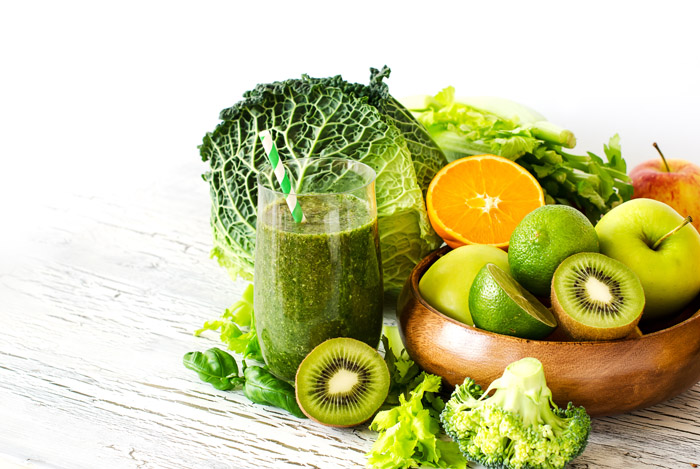 Since cortisol lowers immunity, we need to counteract this with some added vitamin C. Even more importantly, vitamin C has been shown to reduce both the physical and psychological effects of stress.
Since cortisol lowers immunity, we need to counteract this with some added vitamin C. Even more importantly, vitamin C has been shown to reduce both the physical and psychological effects of stress.
In one study, German researchers asked 120 people to speak in public, whilst dealing with math problems – enough to stress anyone out!
Half the people were given 1,000 mg of vitamin C, while the other half weren’t. Those who took the supplement reported feeling less stressed, and they also showed lower cortisol and blood levels than the other group.
Earlier animal studies have shown similar results. Rats subjected to prolonged stress and then given vitamin C experienced lower levels of cortisol and other stress hormones compared with those given a placebo.
Foods high in vitamin C include:
- Yellow bell peppers – one contains 569% of your recommended daily value (RDV)
- Red bell peppers – one contains 317% RDV
- Guava – one fruit contains 209% RDV
- Broccoli – one medium stalk contains 195% RDV
- Papaya – one cup of cubes contains 144% RDV
- Kale – one cup chopped contains 134% RDV
Foods Rich in Tryptophan
 As I mentioned earlier, tryptophan is an amino acid that can boost serotonin levels in the brain, offsetting some of the effects of stress.
As I mentioned earlier, tryptophan is an amino acid that can boost serotonin levels in the brain, offsetting some of the effects of stress.
It also makes you less confrontational. Research published in the Journal of Psychiatry and Neuroscience shows that argumentative people who consumed tryptophan become much more pleasant and agreeable!
Good sources of tryptophan include:
- Roasted soybeans – one cup contains 191% RDV
- Turkey – a 3 oz serving contains 123% RDV
- Tuna fish – a 3 oz serving contains 102% RDV
- White beans – one cup, cooked contains 74% RDV
- Reduced fat mozzarella – one ounce contains 57% RDV
- Pumpkin & squash seeds – one ounce contains 48% RDV
Black Tea
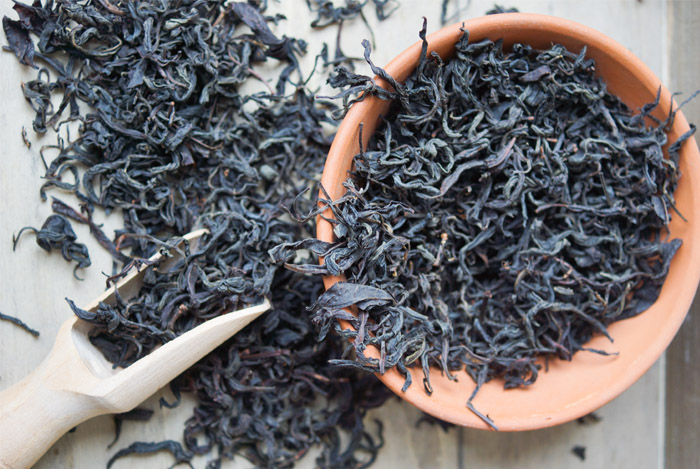 Many people who are stressed reach for a calming cup of tea. It’s not just an old wives’ tale – science backs up tea’s soothing abilities.
Many people who are stressed reach for a calming cup of tea. It’s not just an old wives’ tale – science backs up tea’s soothing abilities.
In one study, 75 healthy males were divided into two groups. Over six weeks those in one group drank four cups of tea daily, while the others had a caffeinated beverage without tea’s other ingredients.
They were then exposed to ‘everyday stresses’ while their stress hormone, blood pressure, heart rate, and self-reported levels of stress were monitored.
Those in the tea group recovered much quicker from the effects of stress exposure than those in the placebo group.
Green Tea
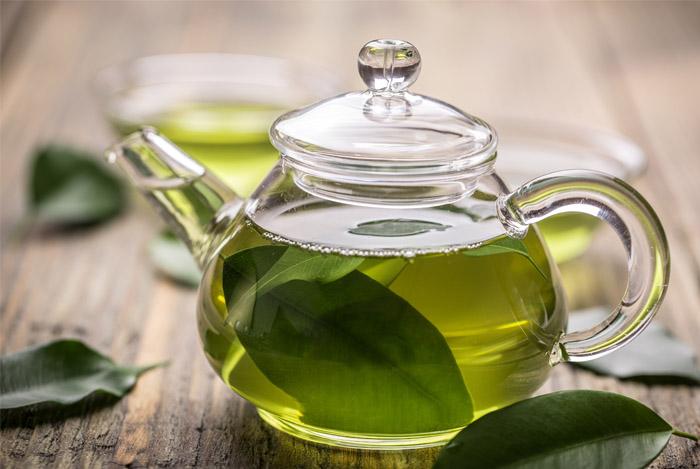 Green tea is another option if you can’t stomach the black variety but want a warming and comforting drink.
Green tea is another option if you can’t stomach the black variety but want a warming and comforting drink.
Green tea contains l-theanine, an amino acid that has anti-anxiety effects.
Research published in 2006 states that animals studies suggest that l-theanine increases brain serotonin and dopamine levels, as well as GABA levels – all substances that have a positive effect on our mood.
Other studies have shown that the polyphenols in green tea have anti-depressant like effects, which further boost the mood and protect against stress. Green tea has also been associated with a lower overall level of psychological distress.
Fatty Fish
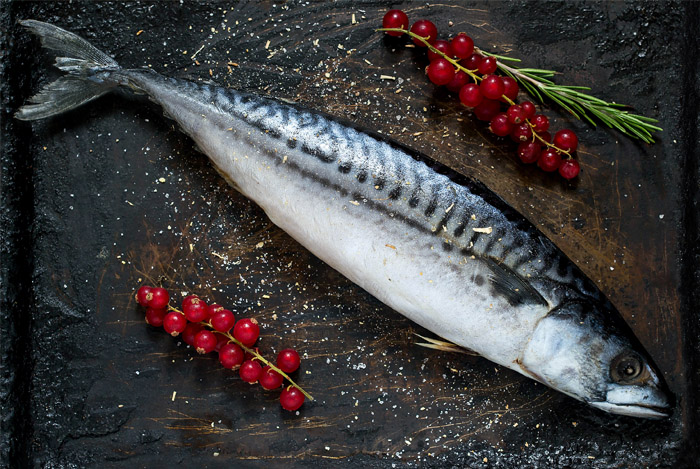 Fish and seafood, especially salmon, mackerel, herring and sardines, are rich sources of omega 3 fatty acids – essential fats that most Americans don’t get enough of in their diets.
Fish and seafood, especially salmon, mackerel, herring and sardines, are rich sources of omega 3 fatty acids – essential fats that most Americans don’t get enough of in their diets.
Of the two types of omega 3 (DHA and EPA), high levels of EPA have been linked with lower levels of depression, anxiety and stress.
Several studies, including ones in 2003, 2005 and 2011, have shown that increasing your intake of EPA omega 3 fats improves ability to handle stress and boosts mood.
Another study, published in Brain Behavior and Immunity, showed omega 3s led to an impressive 20% reduction in anxiety among medical students – a pretty stressful job I think you’ll agree!
As per the American Heart Association guidelines, you should be aiming for at least two servings of fatty fish a week.
Leafy Greens
 It seems there’s little that dark leafy green vegetables can’t help with – from balancing hormones to beating fatty liver disease to cleansing your kidneys.
It seems there’s little that dark leafy green vegetables can’t help with – from balancing hormones to beating fatty liver disease to cleansing your kidneys.
Research suggests that they help with stress too.
After all, they’re high in folate – a B vitamin necessary to produce the neurotransmitters serotonin and dopamine, which reduce stress.
A 2012 study, published in the Journal of Affective Disorders, evaluated the relationship between folate intake and depressive symptoms. They found that those who had the highest intake of folate had a lower risk of depression.
Enjoy a wide range of leafy greens in your diet – including spinach, mustard greens, collard greens, watercress, chicory, chard and cabbage.
For inspiration on how to cook with greens, check out these 12 delicious kale recipes.
Dark Chocolate
 The fact that you cheer up when you chomp on some chocolate isn’t coincidence, it’s a proven mood booster.
The fact that you cheer up when you chomp on some chocolate isn’t coincidence, it’s a proven mood booster.
A study published in 2013 reported that drinking an antioxidant-rich cocoa drink (equal to about 1.5 ounces of dark chocolate) daily for 30 days led to participants feeling calmer than those who drank the placebo.
An earlier 2009 study found that dark chocolate with 74% cocoa solids may help highly anxious people reduce their stress response.
Eating 40 g of dark chocolate a day for 2 weeks caused a significant reduction in the levels of stress hormones as well as reducing self-reported feelings of anxiety in participants.
However, those who had low levels of anxiety didn’t benefit from the chocolate.
I should also point out that 40 g a day is a lot of chocolate. I recommend sticking to one or two squares a day and adding in lots of the other stress-busting foods listed here instead.
Avocado
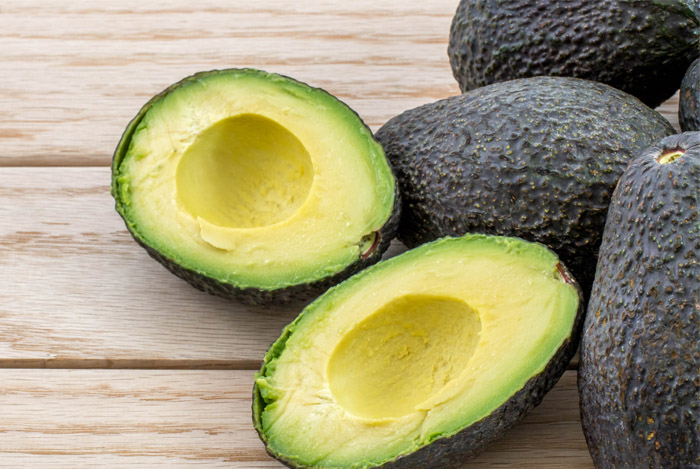 Avocados are an incredibly nutrient rich food, just check out all the health benefits they provide.
Avocados are an incredibly nutrient rich food, just check out all the health benefits they provide.
Studies show that eating avocados can help regulate blood sugar levels – something that can keep your mood up, even when stressed.
One such study, published in the Nutrition Journal, found that eating just half an avocado with lunch helped overweight people feel satisfied and full for longer after eating.
They also had their blood glucose and insulin levels measured at specific intervals with researchers finding that participants showed no increase in blood sugar levels when compared to those who ate a standard lunch with no avocado.
Avocados are also a natural source of potassium, one fruit contains 28% of your recommended daily potassium intake.
The American Heart Association advises that a diet rich in natural sources of potassium is important for controlling blood pressure, which is important as high blood pressure is linked to high stress levels.
What to Avoid for Stress Relief
While some foods can relieve your stress, others can exacerbate it. Eliminate the following foods for a ‘Zen’ state of mind.
Coffee
 When I’m stressed out, I feel like there aren’t enough hours in the day. It’s really tempting to down a whole pot of coffee so I can keep working all night. But, I know it’s not the best idea.
When I’m stressed out, I feel like there aren’t enough hours in the day. It’s really tempting to down a whole pot of coffee so I can keep working all night. But, I know it’s not the best idea.
The caffeine in coffee increases your stress hormones, including cortisol and it does so whether you’re at rest or undergoing some serious mental stress.
High cortisol levels have been linked to mental problems like memory loss, along with insulin resistance, which can eventually lead to diabetes.
Bottom line – if you’re stressed out, swap the coffee for green or black tea.
Sugar
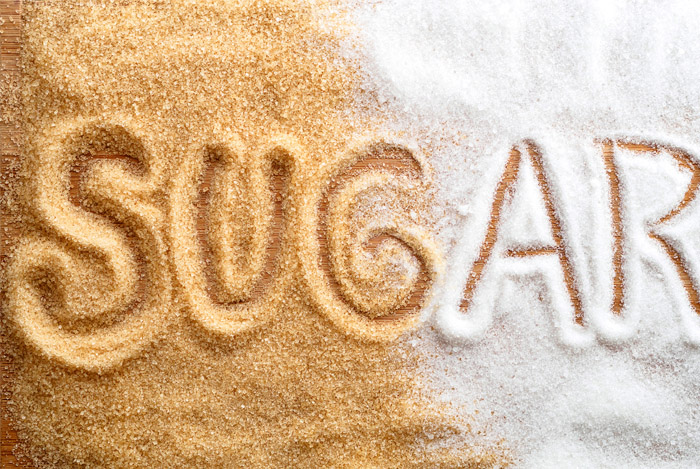 Most people think that sugar is a stress reliever, but that couldn’t be further from the truth.
Most people think that sugar is a stress reliever, but that couldn’t be further from the truth.
According to the non-profit charity Food For The Brain (a group of doctors, scientists, nutritionists, psychiatrists and psychologists), there is a correlation between behavioral changes and blood sugar levels.
While sugar doesn’t actually cause stress, it makes the symptoms of it much worse. In fact, sugar has a negative impact on just about every aspect of our health.
Discover just a few of the amazing things that will happen your body when you quit sugar.
Processed Foods
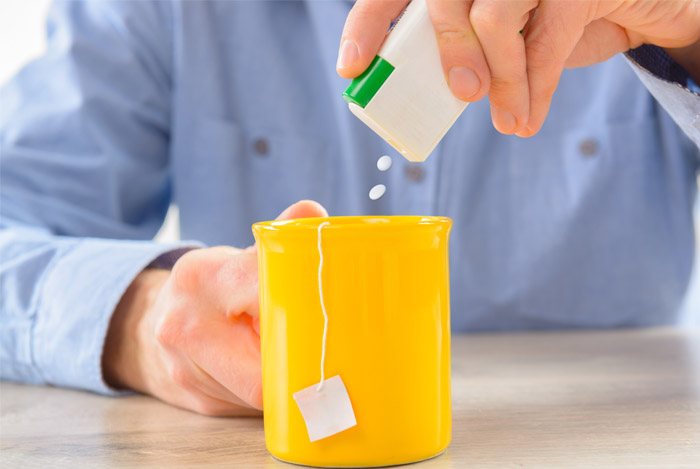 In addition to sugar, processed foods contain a lot of questionable ingredients, many of which can affect your mood, and your overall health.
In addition to sugar, processed foods contain a lot of questionable ingredients, many of which can affect your mood, and your overall health.
For example, studies in 2007 and 2013 found that a compound in the artificial sweetener aspartame can cause reduced levels of dopamine and serotonin in the brain.
Other additives, like MSG and artificial colorings and flavorings are also pretty unhealthy and unnecessary in any diet.
Other Lifestyle Changes to Beat Stress
As well as changing your diet, here are a few more healthy living tips to help you curb your stress levels.
Soak Up the Sun
 I don’t know about you, but as soon as I feel the sun on my skin I feel my stress melt away.
I don’t know about you, but as soon as I feel the sun on my skin I feel my stress melt away.
In fact, research shows that the brain produces more serotonin on sunny days than on darker days.
We also get vitamin D from the sun, an important vitamin that’s vital for various bodily functions. And what do you know? Stress, fatigue and depression are all connected to low levels of vitamin D.
Learn more about the ‘sunshine vitamin’ here.
Exercise
 Physical exercise is a great stress reliever. Not only does it help you pound out your frustrations, but it actually reduces stress hormones and stimulates production of feel-good endorphins.
Physical exercise is a great stress reliever. Not only does it help you pound out your frustrations, but it actually reduces stress hormones and stimulates production of feel-good endorphins.
Aim to engage in some sort of physical activity most days and you’ll be benefiting your mind and your body.
Sleep
 Believe it or not, hormones work on a schedule. Cortisol is actually regulated as we sleep – so if we’re not hitting the hay early enough we can expect to be stressed out and overwhelmed the next day.
Believe it or not, hormones work on a schedule. Cortisol is actually regulated as we sleep – so if we’re not hitting the hay early enough we can expect to be stressed out and overwhelmed the next day.
Problems sleeping? Here are some tips for you to try.
Do you suffer with high stress? Have you made any dietary or lifestyle changes to combat its effects?
The post How to Lower your Stress Levels through Diet appeared first on Nutrition Secrets.
http://www.nutritionsecrets.com/how-to-lower-stress-levels-through-diet/
No comments:
Post a Comment